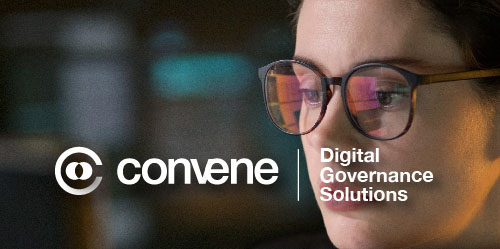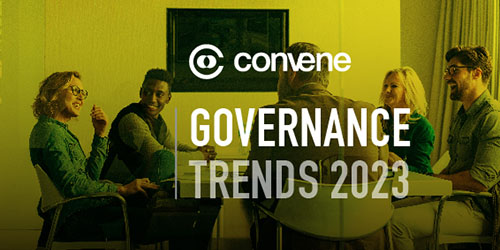A Board resolution is a formal document that confirms the actions and votes taken by the Board of directors at a Board meeting. It outlines the duties of all corporate officers and the outcome of any decisions that were made.
Lottie Wright
Recent posts by Lottie Wright
6 min read
What Is An Advisory Board?
By Lottie Wright on 23/02/23 16:59
An advisory Board is a group of expert individuals who offer advice to the management of an organisation.
Advisory Boards are an advantage to businesses, as they offer more freedom in terms of administration and oversight than a Board of directors.
Topics: Governance Business Insights
6 min read
Why Use A Board Portal?
By Lottie Wright on 20/02/23 11:00
Businesses are transitioning away from manual, paper-based procedures and towards digital solutions for their Board processes. This shift has demonstrated many benefits, such as improved communication, streamlined operations, cost savings, and heightened security.
Topics: Governance Board Portal Features Why Convene?
5 min read
What Is A Board Portal?
By Lottie Wright on 17/02/23 16:02
A Board portal is a solution for running seamless meetings in the digital age. Board portals enable digital Board meetings between Boards of directors.
Topics: Governance Board Portal Features
7 min read
5 Top Tips For Effective Board Reports
By Lottie Wright on 09/02/23 16:35
With more and more organisations transitioning into remote and online meetings, traditional in-person Board meetings are becoming a thing of the past.
In order to maintain order within your organisation, effective Board reports are key to keeping things running smoothly.
What Is A Board Report?
A Board report is information from several departments or committees condensed into a short and readable format. These reports are kept as records and are a part of the Board meeting minutes. These reports are useful as they document the actions of the Board and so can be called upon at any time, especially if there are any legal issues.
Board reports should be reviewed by every member of the Board of directors and it should be made sure that the details of the report remain intact.
Board reports are usually prepared by the executive committees, as the organisation's executive branch reports to the Board.
What Is The Purpose Of A Board Report?
A Board report can serve a lot of different purposes. It can be used for setting milestones in fundraising or for financial reporting.
They are useful tools for bringing Board Members up to speed, reminding said members of the commitments they have made to the organisation and creating a space for discussions and questions to be initiated.
It condenses the information from committees reporting on their tasks and the executive director’s report on the performance of the entire company into a single, easy to digest document. This is then sent to the Board and presented during the Board meeting.
Board reports are crucial documents for every organisation. Knowing how to effectively communicate your organisation's performance, processes, activities, and direction is an important part of good governance.
It informs the Board about company performance, what’s happened since the last meeting, and where the organisation is headed. They can really help in establishing the big picture for an organisation.
Here’s our Top Tips for ensuring your Board reports do their job:
Topics: Governance Executive Committee Business Insights
4 min read
Why Choose Convene?
By Lottie Wright on 06/02/23 14:27
Convene is a pioneer in the Board Portal software market. We are constantly adapting to the shifts and changes in the market, and ensuring customer satisfaction.
Topics: Board Portal Features Why Convene?
3 min read
Convene at the 2023 Board Excellence in Housing Conference
By Lottie Wright on 03/02/23 15:30
Over the 2nd and 3rd of February 2023, Convene sponsored the NHF’s Board Excellence in Housing Conference. We want to thank all of the speakers and attendees for their engagement, as well as the NHF for putting on a fantastic conference.
This year, the conference was an online event. As a Board Portal, we were especially excited to be involved, as we are dedicated to pioneering virtual collaboration and communication.
NHF’s online platform allowed us to participate in a number of informative talks and workshops on topics surrounding Board effectiveness and housing.
A central theme of this conference was flexibility, and the need for housing associations to be open to change due to the uncertainty of this year’s financial landscape.
Speakers were focused on exploring the challenging road ahead, and preparing associations for mitigating this unsteady future, with rising rates of inflation and the cost of living crisis within the housing sector.
Another key theme of this conference was sustainability and monitoring decarbonisation practices for housing associations.
Convene’s Associate Consultant Arturo Dell spoke about the Sustainability Reporting Standard (SRS) and the challenge of reaching decarbonisation targets with the current speed of progress within the sector.
He spoke about Convene ESG, and the importance of data integrity and quality for housing associations to manage their sustainability.
With Convene ESG, the aim is to alleviate some of the challenges of ESG data gathering, performance tracking, and reporting for ESG factors so organisations can move towards global sustainability and net zero.
Arturo expressed the importance of associations and organisations embedding ESG principles into the fabric of the organisation, and this links to another vital theme of the conference which was a focus on inclusivity and diversity.
The NHF launched their Roadmap to Equality: an Inclusive Future resources, and alongside this was a series of talks about the importance of diversity and inclusion, especially for housing associations that work so closely with a diverse range of people.
Speakers highlighted how crucial it is that Boards reflect the communities they serve, and how there is still a lot of key work to be done to improve diversity, equality and inclusion at every level of organisations.
This tied into the conference’s overall emphasis on a need for both change and changeability for housing associations.
Here at Convene, we want to make sure you have software you can rely on, even in uncertain times.
As the leading Board Portal Provider for the Housing sector, the future of the industry is extremely important to us. We want to help pioneer flexible, sustainable and accessible communication for your housing association.
Convene is an all-in-one Board Portal designed to streamline meetings, and it is now fully integrated with Microsoft Teams, so you can have your workflow all in one place.
We also feature Convene ESG, our own ESG reporting tool, to help your organisation get one step closer to Board excellence.
To find out more about how Convene can help your organisation, you can contact us or book a demo today. Or read our success stories from your peers here.
Topics: Governance Housing
4 min read
Is ESG Mandatory?
By Lottie Wright on 19/01/23 16:09
In recent years, organisations have had to face increasing operational and compliance risks in both their industries and communities.
One way to confront and address these issues is by utilising a sustainability lens, or an environmental, social and governance (ESG) lens.
What is ESG reporting?
ESG represents a theory that there is an ethical way to do business, and this method involves prioritising sustainability; focusing on the environment, being socially responsible and establishing transparent governance.
ESG reporting refers to the disclosures of data on the organisation’s operations and how they function within ESG standards.
These disclosures are a great way for organisations to demonstrate their ESG policies, practices, and performance, as well as communicating their goals to different stakeholders: customers, investors, employees, suppliers, lenders, and shareholders.
Reports should cover environmental impact (eg. water/energy usage, waste management, greenhouse gas emissions), social elements (eg. community involvement, labour and diversity practices), and governance (eg. compliance, political contributions, board structure).
Why is ESG important?
Creating a quality ESG report is important for demonstrating your organisation’s commitment to sustainability.
ESG disclosures help further sustainability efforts and good governance practices, as well as enabling a stronger financial performance. The data found in these reports can assist organisations in aligning their purpose, strategy, and operations.
Shareholders and investors can also use ESG reports to understand the related opportunities and risks of the organisation, and see how the company creates sustainable returns and mitigates risks.
Additionally, ESG disclosures can be a useful tool for maintaining transparency. They can aid in shaping better environmental, social, and governmental practices for the future.
Is ESG Mandatory?
Universally, the answer is no, not yet. However, according to the International Sustainability Standards Board (ISSB), recently more global investors have been requesting transparency and quality ESG reporting.
While several countries have incorporated measures requiring mandatory ESG disclosures, it has not yet reached a global scale. Steps are being taken to create a worldwide framework for ESG reporting standards, in order to facilitate the standardisation of the ESG reporting process.
One such step came in November 2021, when the IFRS Foundation established the International Sustainability Standards Board (ISSB). The ISSB is focused on generating global sustainability standards for investors for its participating countries.
Another example of this came at the end of June 2022, where the European Parliament and the Council (EU Member States) agreed to require the mandatory reporting on ESG for a considerable number of companies operating on the EU market.
Large or listed subsidiaries of non-EU companies will have to report for fiscal year 2025 on the basis of European Sustainability Reporting Standards.
ESG Reporting in the UK
At present, the UK has no single ESG law or regulation. The UK’s ESG policy consists of domestic and EU-derived laws and regulations, many of which are not ESG-focused.
However, a key regulation for UK ESG disclosures is the Companies Act, as it includes requirements for annual reporting. These rules apply to larger companies that are listed, have more than 500 employees or exceed £500 million in annual turnover
Non-financial information has always been a requirement of annual reports, but in 2022, the Act was extended to include sustainability details. Large UK companies are now required to report on their energy use and carbon emissions as a part of their annual reports.
Some sectors and organisations of a certain size now have standards they may have to report against. For example, the Housing sector has the Sustainability Reporting Standard, which whilst currently optional is paving the way for industries to specialise and standardise their ESG reports.
Additionally, starting in 2023, ESG reporting in the UK will be further defined through Sustainability Disclosure Requirements (SDRs). These SDRs will provide a structure for organisations to manage sustainability opportunities, potential risks and impacts, as well as set specific metrics and targets.
While the SDRs are rolled out over the next two years, fully mandatory disclosure is expected by 2025.
How Can Convene Help With Your ESG Reporting?
Here at Convene we have developed our own ESG reporting tool: Convene ESG.
Our aim is to alleviate some of the challenges of ESG data gathering, performance tracking, and reporting for ESG factors so organisations can move towards global sustainability and net zero.
Designed in collaboration with our clients, Convene ESG makes reporting simple, so you can focus on developing sustainable strategies.
Convene ESG can help you report on a range of existing standards including TCFD, GRI, the SRS amongst a range of others, and are always looking to expand.
It also has a built-in comparison feature, which allows you to compare against competitors' formatting of their publicly accessible reports. This will help your whole sector develop the best results possible.
To find out more about how Convene can help your organisation, you can read about our early adopters here or book a demo.
Topics: Sustainability ESG Business Insights
7 min read
How To Foster Board Diversity
By Lottie Wright on 12/01/23 17:01
Board diversity and fostering inclusive and accessible work environments has been in the spotlight in recent years, not only because of the bottom-line benefits but because improving diversity is the right thing to do.
Topics: Governance Community Business Insights
8 min read
Governance Trends for 2023
By Lottie Wright on 09/01/23 14:07
With 2022 seeing a shift in focus to addressing the climate, energy and cost of living crises – all of which hit the most disadvantaged in society the hardest, 2023 will continue along similar paths. The key things for you to remember for good governance this year are about flexibility and risk management.
Topics: Governance Business Insights
7 min read
How many subcommittees should a Board have?
By Lottie Wright on 13/12/22 13:05
Subcommittees are an essential role in good governance practices, but it can be tricky to know when to use them. You don't want to have too many overloading your Board Members workload, but you also need subcommittees to ensure that projects and issues are managed effectively. So we have put together this helpful guide so you can navigate the challenges.













